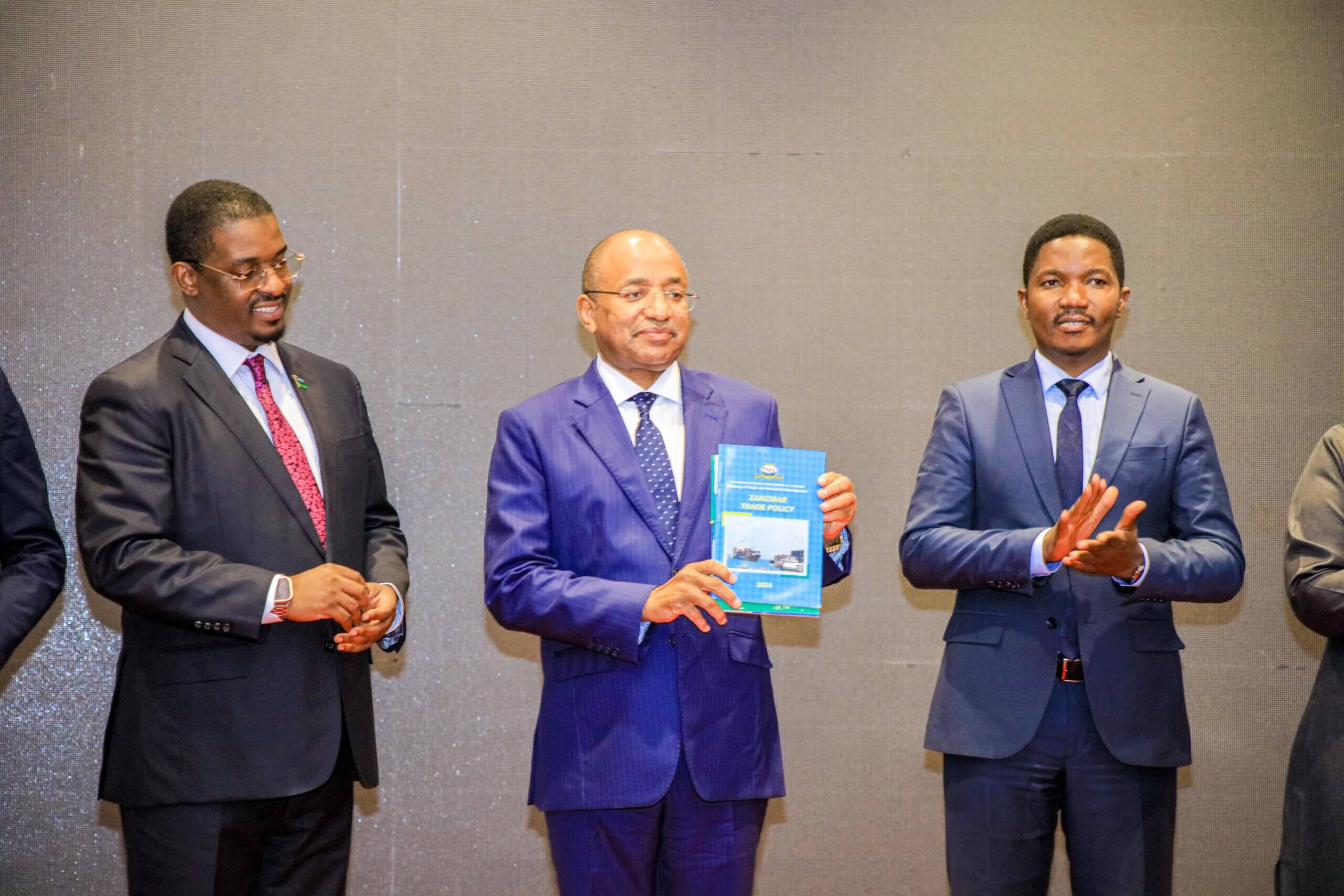From left to right: H.E. Omar Said Shaaban, Minister for Trade and Industrial Development, Zanzibar; H.E. Dr. Hussein Ali Mwinyi, President of Zanzibar and Chairman of the Revolutionary Council, and H.E. Dr. Selemani Saidi Jafo, Minister of Industry and Trade, United Republic of Tanzania, during the launch of the Zanzibar Trade Policy, Regulatory Reform Blueprint, and NTBs Committee- marking a significant milestone in strengthening Zanzibar’s business environment and enhancing regional trade integration.
Zanzibar, 30 April 2025: The Revolutionary Government of Zanzibar, through the Ministry of Trade and Industrial Development, today unveiled the Zanzibar Trade Policy 2024, the Blueprint for Regulatory Framework Reform, and officially launched the Non-Tariff Barriers (NTBs) Committee. These reforms, supported by TradeMark Africa (TMA) with funding from the UK International Development, the Government of Ireland, and Norway, seeks to accelerate economic transformation by creating a more efficient, predictable, and competitive business environment. The new Trade Policy positions Zanzibar as an emerging hub for trade in services and manufacturing within Eastern and Southern Africa, aligning with regional, continental, and global trade frameworks such as AfCFTA, EAC Vision 2050, and the SDGs. The Blueprint sets out 18 targeted reforms to remove regulatory bottlenecks, harmonise business procedures, streamline licensing, and foster investment, while the NTBs Committee will proactively identify and resolve barriers to trade across sectors.
Speaking at the launch, Hon. Omar Said Shaaban, Minister of Trade and Industrial Development, said: “Today marks a historic turning point for Zanzibar’s economy. Through the Zanzibar Trade Policy and the Blueprint for Regulatory Reform, we are establishing a trade and business environment that is modern, competitive, and sustainable. We are removing barriers to trade, promoting fair competition, and empowering our entrepreneurs to seize opportunities across Africa and global markets. Through these reforms, we signal to domestic and international investors alike that Zanzibar is open for business, committed to transparency, and determined to thrive and compete in the global economy.”
Zanzibar Trade Policy 2024 outlines strategic priorities to transform Zanzibar into a centre of excellence for trade in services and goods within Eastern and Southern Africa. With a ten-year implementation horizon and an investment plan estimated at TZS 42.95 billion ($16million), the policy focuses on reducing the cost of doing business, harmonising trade procedures, formalising informal enterprises, and promoting value addition for export competitiveness. Complementing the Policy, the Blueprint for Regulatory Reform provides a comprehensive framework to dismantle bureaucratic inefficiencies.1 It addresses critical regulatory gaps such as overlapping mandates among institutions, complex licensing regimes, delays in customs clearance, and the lack of coordination among regulators. Major reforms include the consolidation of licensing procedures, mutual recognition of standards and certifications, and the development of modern dispute resolution mechanisms for businesses. Zanzibar’s economy, with a GDP growth rate of 7.4% in 2023, aims to leverage trade, services, tourism, and blue economy sectors to sustain its momentum and reduce business costs through regulatory efficiency.

Highlighting the role of strategic partnerships, Elibariki Shammy, TradeMark Africa Country Director, noted: “Trade reforms do not happen by chance. They require deliberate leadership, collaboration, and vision. Today’s launch reaffirms that Zanzibar is embracing these principles by modernising its trade systems, opening new opportunities for its people, and strengthening its position in regional and global markets. We are proud to partner with the Government in this transformative journey.” A major component of the reforms is the establishment of the NTBs Committee, tasked with monitoring and addressing obstacles to cross-border trade. By resolving issues such as standards compliance, customs procedures, and certification duplications, the Committee will drive down the costs and delays that undermine Zanzibar’s competitiveness.
Private sector participation remains central to the reforms. With informal businesses still accounting for over 41% of Zanzibar’s economy, the Trade Policy prioritises formalisation initiatives, innovation promotion, SME empowerment, and capacity building in areas such as intellectual property rights, e-commerce, and quality standards. Hon. Omar Said Shaaban concluded by stating: “Our vision is not only to boost trade statistics but to fundamentally change lives to create jobs, stimulate innovation, and empower our youth and entrepreneurs. These reforms are about building an economy where opportunity is not a privilege but a right accessible to all Zanzibaris.” The launch of the Trade Policy, Blueprint, and NTBs Committee marks a bold step in advancing the Zanzibar Development Vision 2050, setting a clear trajectory towards greater regional integration, improved business confidence, and inclusive economic growth.















